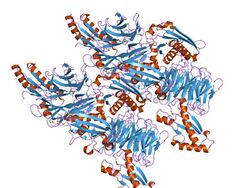Biology:OmpA domain
| OmpA family | |||||||||
|---|---|---|---|---|---|---|---|---|---|
 crystal structure of tolb/pal complex | |||||||||
| Identifiers | |||||||||
| Symbol | OmpA | ||||||||
| Pfam | PF00691 | ||||||||
| InterPro | IPR006665 | ||||||||
| PROSITE | PDOC00819 | ||||||||
| SCOP2 | 1r1m / SCOPe / SUPFAM | ||||||||
| TCDB | 1.B.6 | ||||||||
| |||||||||
In molecular biology, the OmpA domain is a conserved protein domain with a beta/alpha/beta/alpha-beta(2) structure found in the C-terminal region of many Gram-negative bacterial outer membrane proteins, such as porin-like integral membrane proteins (such as ompA), small lipid-anchored proteins (such as pal), and MotB proton channels.[1][2][3][4] The N-terminal half of these proteins is variable although some of the proteins in this group have the OmpA-like transmembrane domain at the N terminus. OmpA from Escherichia coli is required for pathogenesis, and can interact with host receptor molecules.[5] MotB (and MotA) serve two functions in E. coli, the MotA(4)-MotB(2) complex attaches to the cell wall via MotB to form the stator of the flagellar motor, and the MotA-MotB complex couples the flow of ions across the cell membrane to movement of the rotor.[4]
See also
References
- ↑ "In vitro characterization of peptidoglycan-associated lipoprotein (PAL)-peptidoglycan and PAL-TolB interactions". J. Bacteriol. 181 (20): 6306–11. October 1999. doi:10.1128/JB.181.20.6306-6311.1999. PMID 10515919.
- ↑ "Homology of the root adhesin of Pseudomonas fluorescens OE 28.3 with porin F of P. aeruginosa and P. syringae". Mol. Gen. Genet. 231 (3): 489–93. February 1992. doi:10.1007/BF00292721. PMID 1538702.
- ↑ "Export and sorting of the Escherichia coli outer membrane protein OmpA". J. Bioenerg. Biomembr. 22 (3): 441–9. June 1990. doi:10.1007/BF00763176. PMID 2202726.
- ↑ 4.0 4.1 "The Escherichia coli MotAB proton channel unplugged". J. Mol. Biol. 364 (5): 921–37. December 2006. doi:10.1016/j.jmb.2006.09.035. PMID 17052729.
- ↑ "Outer membrane protein A of Escherichia coli K1 selectively enhances the expression of intercellular adhesion molecule-1 in brain microvascular endothelial cells". Microbes Infect. 9 (5): 547–57. April 2007. doi:10.1016/j.micinf.2007.01.020. PMID 17368067.
 |

